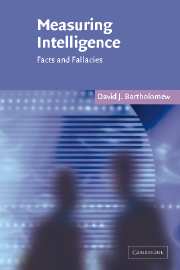Book contents
- Frontmatter
- Contents
- List of figures
- Preface
- Acknowledgement
- 1 The great intelligence debate: science or ideology?
- 2 Origins
- 3 The end of IQ?
- 4 First steps to g
- 5 Secons steps to g
- 6 Extracting g
- 7 Factor analysis or principal components analysis?
- 8 One intelligence or many?
- 9 The Bell Curve: facts, fallacies and speculations
- 10 What is g?
- 11 Are some groups more intelligent than others?
- 12 Is intelligence inherited?
- 13 Facts and fallacies
- Notes
- References
- Index
11 - Are some groups more intelligent than others?
Published online by Cambridge University Press: 22 September 2009
- Frontmatter
- Contents
- List of figures
- Preface
- Acknowledgement
- 1 The great intelligence debate: science or ideology?
- 2 Origins
- 3 The end of IQ?
- 4 First steps to g
- 5 Secons steps to g
- 6 Extracting g
- 7 Factor analysis or principal components analysis?
- 8 One intelligence or many?
- 9 The Bell Curve: facts, fallacies and speculations
- 10 What is g?
- 11 Are some groups more intelligent than others?
- 12 Is intelligence inherited?
- 13 Facts and fallacies
- Notes
- References
- Index
Summary
The big question
Here we move into one of the most contentious areas of all. Much of the debate which followed the publication of The Bell Curve took place over the question of whether American whites were inherently more intelligent than blacks and, though with rather less fervour, whether those of Asian origin were more intelligent than either. Differences across time have also attracted attention. It appears that IQ has increased in many parts of the world over the last few generations – the so-called Flynn effect. These simple sounding statements conceal fundamental questions about whether it is possible to compare groups at all. We have seen that measures of intelligence are defined relative to a particular population. How then can it be possible to make comparisons between populations? This is the question that this chapter seeks to explore. The going will not always be easy but, as we have said before, getting to the bottom of the arguments is essential if we wish to take part in the debate.
Although we speak of one group being more intelligent than another, we already know that such statements cannot be given a precise meaning. Intelligence is multidimensional and this fact prevents us from even ranking individuals unambiguously. The question will have to be worded in terms of some quantity which can be expressed on a one-dimensional scale.
- Type
- Chapter
- Information
- Measuring IntelligenceFacts and Fallacies, pp. 110 - 125Publisher: Cambridge University PressPrint publication year: 2004



